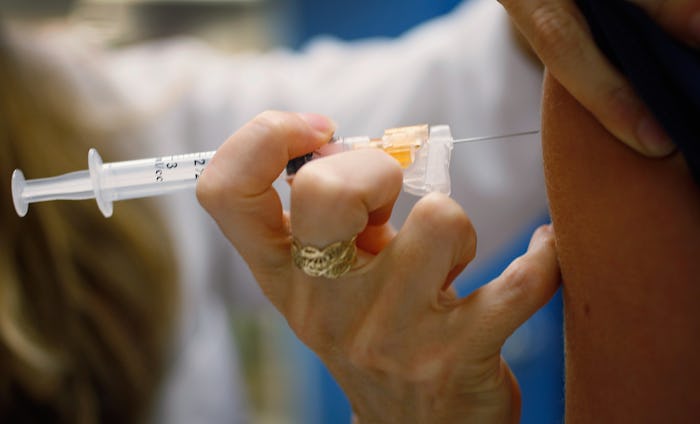Life

New HPV Vaccine Program For Boys & Girls In The U.K. Could Help Save Many Lives
Teenage sex is inevitable. As a parent, this might make you shudder, but facts are facts. And the only way to protect kids is through education, protection, and prevention. For years, girls have been offered the Human Papilloma Virus (HPV) vaccine when they're around 11 or 12 years old to help prevent the spread of the sexually transmitted virus known to cause cervical cancer, but should boys also get the HPV vaccine? Health officials in the United Kingdom have made a move to offer the vaccine to boys as well, just as they have to girls.
Starting in September of this year, boys in British schools will be offered the HPV vaccine for the first time as part of a government health program, according to CNN. Since the vaccine was introduced in the United Kingdom, Public Health England, a government agency of the Department of Health and Social Care, notes that it has reduced infection in ages women 16 to 21 by 86 percent.
"Offering the vaccine to boys will not only protect them but will also prevent more cases of HPV-related cancers in girls and reduce the overall burden of these cancers in both men and women in the future," Dr. Mary Ramsay, Head of Immunization at Public Health England, said said in a press release issued by the agency.
The vaccine will be offered free of charge for boys, as well as girls, in grade eight of secondary school across England, Wales, Scotland, and Northern Ireland, as Reuters reported, which noted that the move comes 11 years after girls were first offered the vaccine.
Most cervical cancers are spurred by HPV, and are responsible for many types of cervical cancer, according to the Mayo Clinic. The HPV vaccine, which also goes by the prescription name of Gardasil, can also help prevent vaginal and vulvar cancer in women, and can help prevent genital warts and anal cancer in women and men, according to Planned Parenthood. What's more, the University of Warwick estimates that by 2058, the current vaccine will prevent up to 64,138 HPV-related cervical cancers and 49,649 other HPV-related cancers, according to Technology Networks.
This isn't the first time that the need for both sexes to receive the HPV vaccine has been brought up. In fact, Gitte Lee-Mortensen, a medical anthropologist based in Denmark touch on this in 2012, saying that it's important for the public to view this vaccine as one for both male and female. "We need to change the perception of HPV vaccine as a girls-only vaccine, and move towards presenting it as a vaccination for both genders," Lee-Mortensen said, according to Vaccines Today. "It might also be wise to remove the focus on Sexually Transmitted Infections (STIs) to show that it’s a common virus that almost everybody comes into contact with during their lifetime."
It's important to note that almost everyone who is sexually active will contract the virus at one point or another due to its highly contagious nature, if not given the vaccine, according to the Planned Parenthood.
The U.S. Centers for Disease Control and Prevention (CDC) recommends that children receive the vaccine between 11 to 12 years old — in two doses six months apart. While parents may fear that getting the vaccine may increase the likelihood of teen sex, it has not been linked with an earlier start to sexual behavior, according to the National Institute of Health.
Given the statistics, vaccines for the virus are more important than ever. According to Reuters, HPV is linked to more than 99 percent of cervical cancers, as well as 90 percent of anal cancers, about 70 percent of vaginal and vulvar cancers and more than 60 percent of penile cancers.
As for the United States, health officials voted unanimously last month to offer the HPV vaccine to both boys and girls, according to the CDC's Advisory Committee on Immunization Practices, and it's essentially up to parents to get their child vaccinated. With 5 percent of the world's cancers linked to HPV, according to Reuters, the increased number of children receiving the vaccine stands to stop thousands of cases of virus related cancers.
Could HPV be irradiated at some point? With the work to make the vaccine more widely available and advances in technology, it's hopefully a very real possibility. But with all this said, more education for parents, practitioners, and kids and general awareness is still needed.